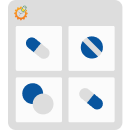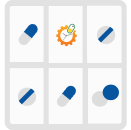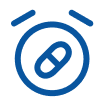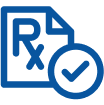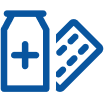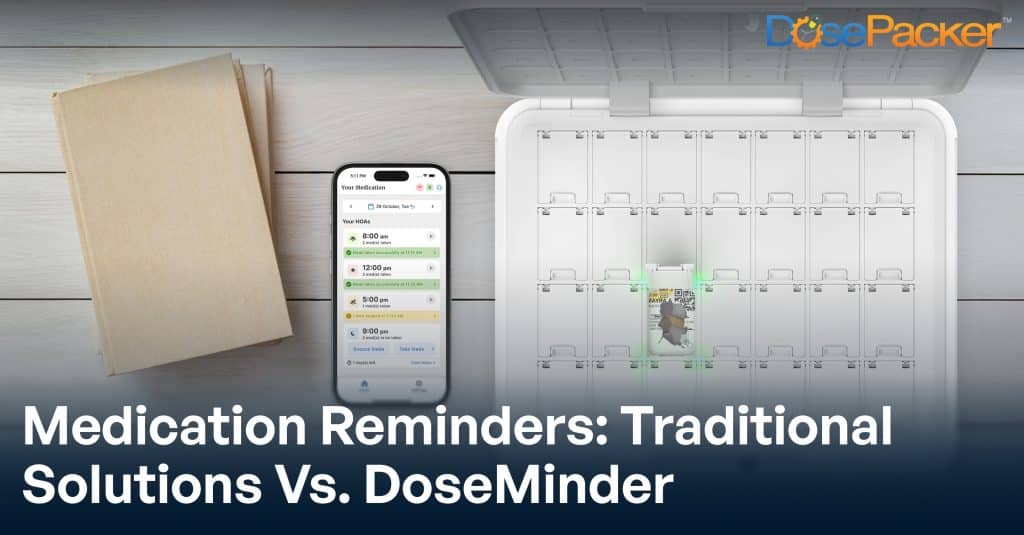Unlock the latest in medication management technology and grow your care community with us.
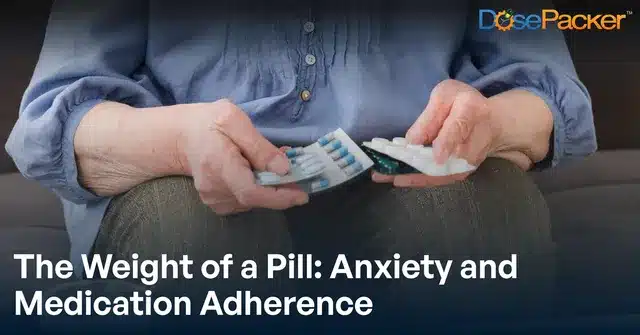
Taking medications seems simple enough: open a bottle, take a pill, repeat. Yet, for millions of people, this daily routine can feel like scaling a mountain.
But why is something so essential often so difficult? The answer lies in a mix of psychological, emotional, and logistical factors. According to a 2020 study, about 30% to 50% of the population don’t adhere to their medications due to pharmacophobia—the fear or anxiety surrounding medications.
For some, the fear is so strong that they avoid taking their prescribed medications altogether, even when they know it’s essential for their health. Understanding these challenges is the first step toward better adherence.
By exploring the psychological and scientific factors behind medication-taking behaviors, we can uncover ways to make the process easier, safer, and less stressful for patients. So let’s dive right in!
The Importance of Medication Adherence
According to the American Heart Association, medication adherence is all about taking your meds as directed. This simple act alone is crucial for maintaining health, supporting effective ailment management, and contributing to several important outcomes, including:
- Better Health Outcomes.
Medications work effectively only when taken as directed, helping to prevent worsening conditions and unnecessary hospital visits. By staying on track, individuals give themselves the best chance for recovery and long-term health. - Reduced Healthcare Costs.
Non-adherence leads to preventable expenses, including avoidable hospitalizations and costly emergency treatments. Proper adherence benefits both individuals and the healthcare system. - Improved Quality of Life. Adherence keeps health conditions manageable and provides peace of mind. For example:
- Individuals with diabetes often experience better blood sugar control and fewer complications
- Patients with hypertension who adhere to their prescribed regimens can maintain blood pressure levels and significantly lower their risk of heart disease and stroke.
- Non-adherence in patients with Parkinson’s disease leads to poorer quality of life and more severe motor and non-motor complications.
Commitment to adherence empowers individuals to take control of their health.
What Makes Medication Adherence Challenging?
But, these benefits are not less known to us, as patients or caregivers, right? Then why is medication adherence tricky for the majority of us?
The science behind medication adherence isn’t just about remembering to take a pill. Several factors – cognitive, emotional, and physiological – make sticking to a medication routine unexpectedly difficult.
Cognitive Barriers: The Challenge of Memory and Complexity
- Forgetfulness:
With busy schedules and daily distractions, it’s easy to forget a dose, even if the medication is crucial to health. - Complex Regimens:
Following multiple medication schedules, some requiring different doses at different times, can easily lead to confusion and mistakes. Multidose compliance packs, like DosePack, simplify this process by organizing medications by dose and time, ensuring patients take the right medication at the right moment without second-guessing.
Emotional Barriers: Anxiety and Fear
- Fear of Side Effects: Some medications come with a risk of side effects, and patients may hesitate to take their meds if they’re worried about these potential reactions.
- Stigma: For conditions like mental health disorders or chronic illnesses, there may be a societal stigma attached to the treatment, making patients reluctant to stick to their regimen.
- Anxiety: Worries about side effects, the long-term impact of medications, or even the fear that the treatment isn’t working can lead to avoidance.
Managing Anxiety for Better Medication Adherence
Overcoming psychological barriers to medication adherence is possible with the right strategies. By educating patients, building trust, and providing support, we can help them take control of their health.
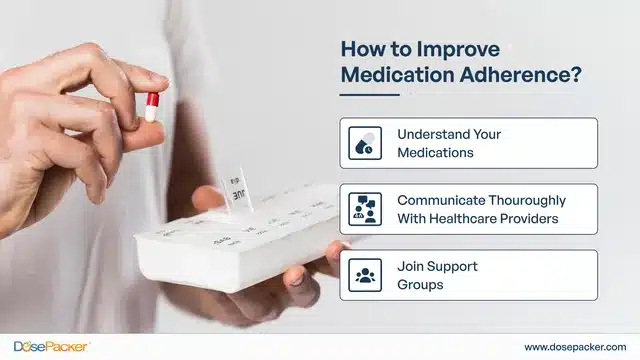
Understand Your Medications
Knowledge is a powerful tool. When patients understand how their medications work and what to expect, it reduces anxiety. Key areas to focus on include:
- Side Effects:
Explaining common side effects and how to manage them. - Medication Purpose:
Helping patients understand why their medications are essential.
Knowing how medication works reduces fear and increases confidence in their treatment.
Communicate Thoroughly with Healthcare Providers
A strong relationship with healthcare providers fosters open communication. When patients trust their doctors, they’re more likely to share concerns. Trust-building is achievable through:
- Open Conversations:
Encourage patients to ask questions about their medications. - Regular Follow-Ups:
Keep patients on track and provide reassurance.
Join Support Groups
Support groups and counseling are great resources for managing anxiety. Connecting with others in similar situations can provide comfort, while counseling helps patients cope with emotional barriers.
- Support Groups:
Shared experiences can offer encouragement and reduce isolation. - Counseling:
Professional support helps manage anxiety and stress.
These tools empower individuals to take charge of their adherence.
The Role of Technology in Medication Adherence
Technology is transforming medication adherence by making it easier to stick to schedules, providing timely reminders, and reducing anxiety about managing medications.
Simplified Medication Schedules with Smart Packaging
DosePacker’s technology-enabled Compliance Packaging simplifies medication management for patients, caregivers, and facilities, reducing the risk of missed doses or incorrect administration.
QR codes and seamless integration with our MyDoses Mobile App and CareCommunityOS senior living software streamline the process for both patients and caregivers. This eliminates the constant worry of whether the right dose was taken at the right time, helping to reduce anxiety and improve confidence in medication adherence.
Dose Reminders and Real-Time Tracking
Staying on track is easiest with DosePacker’s reminders and tracking tools like MyDoses App and DoseMinder.
MyDoses App is a mobile application that empowers individuals to take charge of medication management and enhance treatment and overall well-being. By providing timely reminders and tracking each dose, patients are less likely to forget or take the wrong medication, easing the burden of self-management.
In addition, DoseMinder is an intelligent medication storage device and can be integrated with the MyDoses App to provide auditory and visual cues, guiding patients step-by-step through their medication regimen. This reduces the fear of making errors, creating a calmer and more confident medication experience.
Start Managing Your Medications With Confidence
Start Your Journey Towards Better Adherence and Health
Medication adherence is more than just remembering a pill; it’s about overcoming emotional and practical barriers that can make sticking to a routine difficult. By addressing these barriers, individuals can take steps toward better health and well-being.
At DosePacker, we’re here to make your adherence journey a little easier. We believe that better adherence leads to better health. Our solutions are designed to simplify medication management while providing the reassurance and support needed to stay consistent.
Take control of your medication journey today. Explore how DosePacker can help, and consult with your healthcare provider to create a plan that works for you. Because when it comes to your health, every small effort adds up to something big—and you’ve got what it takes to make it happen.
